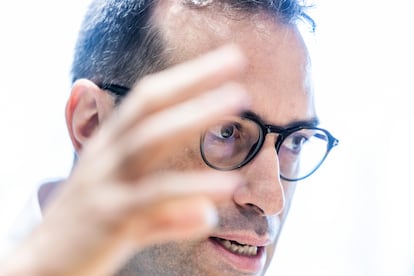Carlos Cuerpo: "The EU's agreement with Trump avoids the worst: a trade war."

Carlos Cuerpo, Minister of Economy, Trade, and Enterprise, meets with EL PAÍS on Thursday after a hectic week, in which the agreement between the EU and the US on tariffs was finalized, a controversial pact that will penalize exports with tariffs of 15%. He also received positive news: economic growth of 0.7% in the third quarter and favorable forecasts from the IMF. Cuerpo (Badajoz, 44) answers confidently without consulting papers, always speaks in a calm tone, and appears optimistic even about the chances of approving the 2026 Budget , a key test of the government's stability. He boasts about the good performance of the Spanish economy, but says he understands the causes of public discontent over the housing situation. He defends the conditions imposed on BBVA's takeover bid for Sabadell, because the value of that operation, he says, cannot be limited to closing offices and eliminating jobs. And he weighs in on the nuclear debate: the useful life of power plants can be extended as long as it's safe and the price doesn't fall on taxpayers or consumers.
Question: The EU has reached an agreement with the US accepting a 15% tariff with no compensation. Some countries, like France, have been very harsh on the agreement. How do you assess it?
Answer: The way to continue strengthening the relationship between the world's two largest trading and economic partners was to reduce barriers, not increase them. Ultimately, more barriers mean more fragmentation. This has an economic cost for everyone, including those who impose them. We must be aware that the new US administration is imposing tariffs not only for commercial reasons, but also for revenue-raising reasons. The agreement avoids the worst-case scenario, which is a trade war. In relative terms, Europe is no worse off than its main competitors in accessing the North American market. From now on, what we must do is help our companies navigate this context.
Q. What alternatives does Europe have?
A. There are two main paths: advancing integration within the domestic market to take advantage of the scale of these 450 million consumers. And, externally, continuing to expand the network of strategic partners. If we are able to ratify the agreement with Mercosur, it would create the largest free trade zone in the world, which would help sectors that may be affected by these tariffs, such as wine and olive oil.

Q. When Trump announced the tariffs in April, you said you didn't think it was necessary to revise your growth forecasts. What's the impact now?
A. In the short term, we don't foresee any changes to our forecasts. Spain is one of the least exposed countries, but that doesn't mean we shouldn't pay particular attention at the sector level where there is greater exposure. That's why we're preparing the second phase of the support plan for affected companies, to see what additional measures are needed.
Q. What would these grants consist of and how would they be funded?
A. We've just learned about the agreement. We're holding meetings these days with the sectors to gather information on what measures they believe could help them, both through ICEX's internationalization services and through financing. Based on this information, we will propose a 2.0 plan to aid companies to discuss with the parliamentary groups. In its previous version, we stated that it was a dynamic, adaptable plan that would adjust to how the situation evolves. We're looking at how to provide them with the tools that best suit their needs, while also reaching more and more companies with personalized services, to help the smaller ones, which don't have the capacity to survive this new context.
We will put all our effort into passing the Budget.
P. Pedro Sánchez has promised that the government will present a draft budget for 2026 , but the usual deadlines are not being met. How will progress be made on the budget, given the difficulty in obtaining parliamentary support, given the recent votes by Podemos and Junts?
A. Starting in September, the first steps will be taken , which involve approving the spending ceiling and distributing the deficit targets. All efforts will be made not only to present the Budget, but also to do so with guarantees of its passage.
Q. Would it be an expansionary or more restrictive budget, given the turbulence in the global economy?
A. Within our fiscal framework, we maintain a balance between growth and reducing our deficit and debt. Our forecast is a 2.5% deficit for this year. And, this is extremely important, we will have a surplus in primary terms [before paying interest on the debt]. We are capable of fulfilling the social and investment commitments we have made in recent years, which therefore represent an eminently expansionary Budget.
Q. Do you really think the legislative period can be completed without a budget?
A. We are managing to achieve all our economic policy objectives. After all, the Budget is the way to express these priorities. Nothing is being left undone. We want to pass this Budget, but we are not leaving anything behind.
Q. This week we learned that GDP is growing faster than that of our European partners, and the IMF ranks Spain as the developed economy with the highest growth next year. What explains this boom?
A. What's driving the momentum now is domestic demand: household consumption and business investment . It's a balanced and more sustainable growth model. We're managing to combine elements that weren't seen in other eras: employment is growing at historic levels, but hourly productivity is also growing more rapidly. Spain is the fifth country in the world in terms of attracting foreign investment between 2018 and 2024. This is no coincidence; it's because there is confidence in the Spanish economy, which has an additional attraction for investors, among other things, due to the competitiveness of our energy model and our commitment to renewables.
We're attacking the housing problem from all angles. There's no silver bullet for that.
Q. The macroeconomic data paint a picture of a healthy economy, but they coincide with growing social unrest, particularly related to housing prices, which are unaffordable for young people, and weak wage growth. Do you understand this public anger?
A. We are fully aware that major macroeconomic figures like growth are a prerequisite: we have to increase the size of the pie. But, from there, the important thing is what we do with that growth. What we want is for it to translate into the microeconomy. That is, into a reduction in inequality, into an improvement in citizens' living conditions. Housing is the challenge of the legislative term that lies ahead. And there is no silver bullet in this regard. We are attacking this problem from all angles. All with the goal of once again having a public housing stock of affordable rental housing that meets our needs.

Q. The EU is experiencing languid growth and is steadily losing ground to the United States and China. A year ago, Mario Draghi and Enrico Letta presented their reports to help Europe gain competitiveness, but nothing seems to be happening. Isn't that disappointing?
A. I think we must continue to raise awareness of the urgent situation highlighted in the Draghi and Letta reports. It's often said that the EU works very well in times of crisis, like COVID. But we now have a situation in which the challenge of competitiveness and productivity doesn't generate that sense of imminent crisis, because it's more of a medium- and long-term issue. But we need to change our mindset. We must be aware that action is urgent to prevent this gap from widening even further. We must remember again and again that this is an emergency.
Q. That explains your hasty race to preside over the Eurogroup when analysts didn't give you a chance.
A. We took the step because we saw the potential. There was a shared sense that we were in a new era and that we needed to give the Eurogroup an active role.
We could decide to expand nuclear power if neither taxpayers nor customers pay for it.
Q. You just mentioned that one of Spain's key competitive advantages is its renewable energy. But since the energy crisis that followed the war in Ukraine and the blackout in Spain , there has been a growing fear of overdependence on clean energy. And this coincides with a debate about whether or not to extend nuclear power plants. What is your position on extending the useful life of these plants?
A. The Vice President [Third, Sara Aagesen] has made it very clear: three conditions must be met: security of supply, guaranteeing safety for citizens, and the cost element, i.e., ensuring that it doesn't end up being paid by taxpayers or customers. We could decide to extend the life of nuclear plants if these three conditions are met.
Q. In Europe, there is a certain shift in favor of nuclear power. The United Kingdom is going to build a new plant.
A. The Spanish government's commitment is to reduce dependence on fossil fuels, which we don't have in Spain and which, therefore, generate additional risk, as we saw during the crisis surrounding the war in Ukraine. Renewable energy has led to a 40% reduction in electricity costs. This means less dependence and greater competitiveness. This commitment is having an impact. We must continue to strengthen it.
Q. As an Extremadura native with a different sensibility, how do you view the unique financing model for Catalonia?
A. We've been living with an outdated model for 11 years. There are essential elements that renewal must encompass. As an Extremaduran, but also for an Asturian, Catalan, or Madrid resident, the first element is sufficiency. And there must be an element of solidarity between autonomous communities, which also includes, and this is important, the different levels of public administration. This is the framework within which we must consider the possible fit of all these dimensions.
Q. There are fears that the Tax Agency, which is functioning reasonably well, will be dismantled in favor of regional tax agencies.
A. Tax administrations can operate in a network or in a more decentralized manner. We must prevent this from hindering data transmission or the efficiency with which the institution operates. But with the technical capabilities we have today, it's something we can control and take advantage of the benefits of a more decentralized approach, closer to the citizen.
The value of BBVA's takeover bid for Sabadell cannot come solely from the elimination of jobs or offices.
Q. Brussels has opened a case against Spain for its role in BBVA's takeover bid for Sabadell, and you've made some statements criticizing the additional conditions imposed by the government. Does this affect you?
A. What the Government has done within the framework of this authorization of domestic regulations is to protect general interests. We are talking about employment and financial inclusion, which are, among others, the main elements we believed could be affected. We have all the legal reports and are at the disposal of the European Commission to provide them with the information necessary for this process.
P. The EU also warns of political obstacles to transnational mergers.
A. We're all aware that we need to move toward banks that are competitive in Europe and can compete with American banks or banks from other regions of the world, but in this transition, we mustn't forget how each state's financial system is configured. Our opinion is that it must be diversified, that we must have entities that can have more direct contact with citizens, more regional, more localized, mid-sized banks that complement the financial system. It's not just about having increasingly larger banks; we must also take into account competition, as valued by the CNMC, financial stability, as valued by the ECB, and the general interest, which is what the government values.
Q. Some conditions your government has imposed make the transaction less profitable. Are they designed to discourage BBVA from pursuing the takeover bid?
A. No, I don't agree. Our initial objective was to see if there were elements of general interest that could be affected and protect them. Both entities are in excellent shape, with good liquidity and solvency figures and distributing dividends to their shareholders. What the government is doing is protecting the general interest, not halting the operation. In fact, it's ongoing, and it will be up to the shareholders to speak to them. In this context, the value of this operation cannot come solely from the elimination of jobs or offices through synergies. There must be additional value. BBVA has considered that it is still interesting for them to move forward with this operation. There are still profits, there are still synergies. It's a recipe that I like.
Q. But once those three or five years pass, during which BBVA and Sabadell cannot merge or cut jobs, does the general interest disappear?
A. What we aim for is for entities to submit a report at the end of those three years, providing a backward-looking view of how those interests have been protected during that period, but also a forward-looking view of how any new corporate structure they may consider will continue to protect those interests. It's important to balance the two points: generating value for shareholders and protecting the general interest.
Q: If a European entity had decided to buy Sabadell, would the terms have been different?
A. If it's proposed, we'll see, but I don't think the procedure will change. We must protect the general interest.

Q. Do you think it's prudent to agree with Huawei to safeguard sensitive data for the Ministry of the Interior, given that Europe is warning of the security risks this company poses?
A. We're talking about a contract where these operators work in a silo, meaning there's no communication with other networks and no sharing of information. Furthermore, there's continuous evaluation of the use of this data, meaning the risk of misuse or malpractice is zero. Beyond this, if we enter into the general discussion about what Europe's relationship with other regions of the world should be, despite China being a major rival, a competitor in many ways, it must also be a strategic partner. We must open up the Chinese market. And we also have to talk about economic security in terms of attracting investment in sectors where we need it.
Q. Last week, the European Commission presented its draft budget for the 2028-2032 period, which reduces resources for the Common Agricultural Policy (CAP). How do you view this draft, which has drawn much criticism from the agricultural sector?
A. What we want is a more ambitious budgetary framework. We are setting many goals in terms of investment, digitalization, climate transition, security, and defense. And we need to generate the financing to undertake all these investments. Common debt must be possible, as has been the case with the pandemic or with the security and defense tool, but also a budget that is commensurate with these challenges. Within this new framework, we must pay dedicated and adequate attention to the agricultural sector and help it remain more competitive. There are many months of negotiations ahead, but it would be good if the budgets were more ambitious. I think it won't be an easy negotiation.
EL PAÍS





